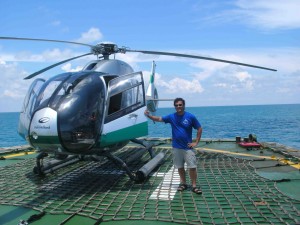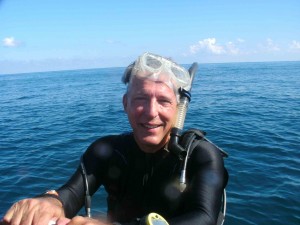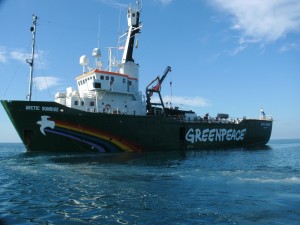NSU Newsroom
SharkBytes
Horizons
This version of NSU News has been archived as of February 28, 2019. To search through archived articles, visit nova.edu/search. To access the new version of NSU News, visit news.nova.edu.
This version of SharkBytes has been archived as of February 28, 2019. To search through archived articles, visit nova.edu/search. To access the new version of SharkBytes, visit sharkbytes.nova.edu.
Oceanographic Center Scientists Accompany Greenpeace Expedition to Investigate Effects of Oil Spill

John Hocevar (right), NSU OC alumnus, on dingy on Gulf cruise.
NSU Oceanographic (OC) professor Charles Messing, Ph.D., and associate professor Joe Lopez, Ph.D., accompanied the Greenpeace vessel, Arctic Sunrise, a former Dutch icebreaker, from Aug. 16 – 19 as it began a three-month research cruise into the Gulf of Mexico to study the effects of the BP oil spill. They were invited by John Hocevar, Greenpeace USA Oceans Campaign leader and NSU Oceanographic Center alumnus. Messing and Lopez focused on the diverse sponge fauna of the Dry Tortugas, a group of islands and reefs some 70 miles west of Key West, now protected as a National Park.

NSU OC associate professor, Jose Lopez, Ph.D. with the helicopter onboard the Greenpeace vessel Arctic Sunrise.
Lopez’s lab has been developing the use of sponges as barometers of environmental degradation and pollution. Because many sponge species can filter several thousand liters of seawater per day, they may be effective proxies for water quality. Lopez will carry out detailed microscopic and genetic research on sponge samples that may be affected by microdroplets of oil or toxic dispersants. Lopez also helped OC doctoral student Andia Chaves Fonnegra’s doctoral dissertation by collecting samples of the excavating sponge, Cliona delitrix. This sponge has detrimental effects on reefs because it can kill corals.

NSU OC professor Charles Messing, Ph.D. after a dive in the Gulf.

Greenpeace vessel Arctic Sunrise in the Gulf of Mexico during oil spill research cruise.
Messing used the opportunity to expand his collections of sponges for the interactive online identification guide to South Florida sponges, and to identify sponges along an existing Florida Fish and Wildlife Conservation Commission reef transect. The opportunity was particularly fortuitous because he already had a research permit from the National Park Service to collect sponges in the Dry Tortugas, but had not been able to get there. He reports finding numerous species of sponges that do not appear to occur elsewhere in the Florida Keys. Some of the samples and results will also contribute to a current National Science Foundation project “Assembling the Sponge Tree of Life” (www.portol.org), which involves both Lopez and Messing.